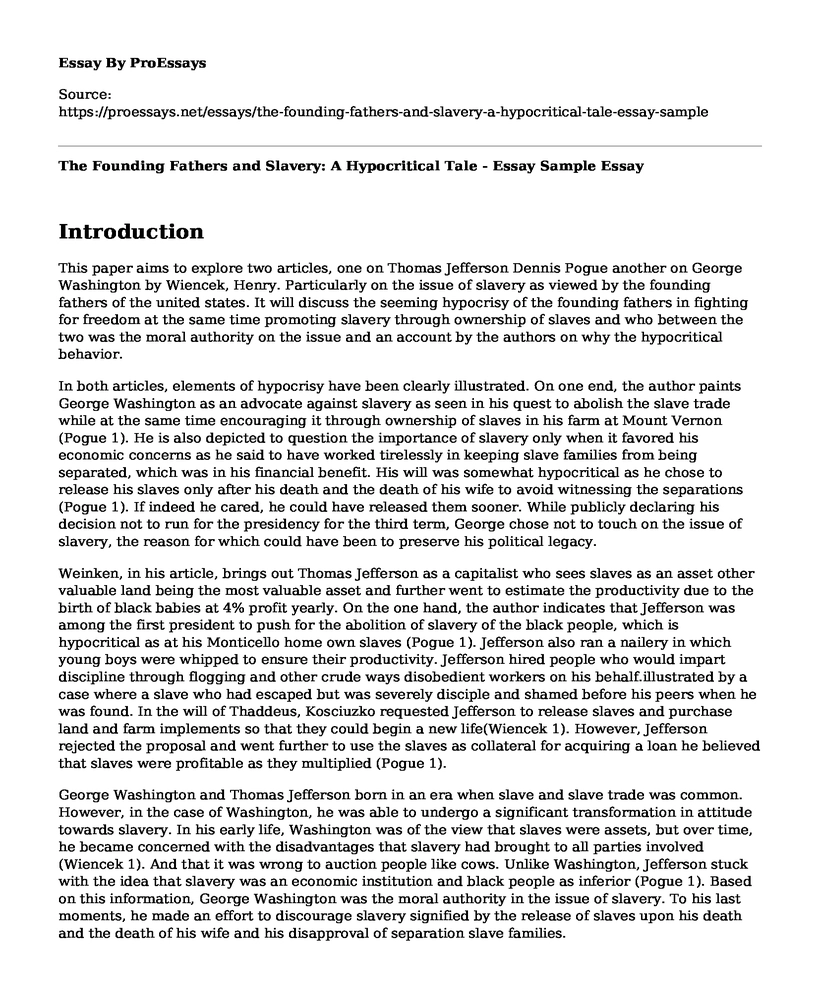Introduction
This paper aims to explore two articles, one on Thomas Jefferson Dennis Pogue another on George Washington by Wiencek, Henry. Particularly on the issue of slavery as viewed by the founding fathers of the united states. It will discuss the seeming hypocrisy of the founding fathers in fighting for freedom at the same time promoting slavery through ownership of slaves and who between the two was the moral authority on the issue and an account by the authors on why the hypocritical behavior.
In both articles, elements of hypocrisy have been clearly illustrated. On one end, the author paints George Washington as an advocate against slavery as seen in his quest to abolish the slave trade while at the same time encouraging it through ownership of slaves in his farm at Mount Vernon (Pogue 1). He is also depicted to question the importance of slavery only when it favored his economic concerns as he said to have worked tirelessly in keeping slave families from being separated, which was in his financial benefit. His will was somewhat hypocritical as he chose to release his slaves only after his death and the death of his wife to avoid witnessing the separations (Pogue 1). If indeed he cared, he could have released them sooner. While publicly declaring his decision not to run for the presidency for the third term, George chose not to touch on the issue of slavery, the reason for which could have been to preserve his political legacy.
Weinken, in his article, brings out Thomas Jefferson as a capitalist who sees slaves as an asset other valuable land being the most valuable asset and further went to estimate the productivity due to the birth of black babies at 4% profit yearly. On the one hand, the author indicates that Jefferson was among the first president to push for the abolition of slavery of the black people, which is hypocritical as at his Monticello home own slaves (Pogue 1). Jefferson also ran a nailery in which young boys were whipped to ensure their productivity. Jefferson hired people who would impart discipline through flogging and other crude ways disobedient workers on his behalf.illustrated by a case where a slave who had escaped but was severely disciple and shamed before his peers when he was found. In the will of Thaddeus, Kosciuzko requested Jefferson to release slaves and purchase land and farm implements so that they could begin a new life(Wiencek 1). However, Jefferson rejected the proposal and went further to use the slaves as collateral for acquiring a loan he believed that slaves were profitable as they multiplied (Pogue 1).
George Washington and Thomas Jefferson born in an era when slave and slave trade was common. However, in the case of Washington, he was able to undergo a significant transformation in attitude towards slavery. In his early life, Washington was of the view that slaves were assets, but over time, he became concerned with the disadvantages that slavery had brought to all parties involved (Wiencek 1). And that it was wrong to auction people like cows. Unlike Washington, Jefferson stuck with the idea that slavery was an economic institution and black people as inferior (Pogue 1). Based on this information, George Washington was the moral authority in the issue of slavery. To his last moments, he made an effort to discourage slavery signified by the release of slaves upon his death and the death of his wife and his disapproval of separation slave families.
Conclusion
In conclusion, the findings in this paper bring out the various aspects of hypocrisy in the abolition of slavery by the founding fathers. The authors have accounted for them as being due to conflicting interests, slavery as an economic system, complexities surrounding the issue of slavery, and also fear of tarnishing their legacies interests. George Washington, however, stands out as the moral authority on the subject of slavery.
Works Cited
Pogue, Dennis J. "George Washington: His Troubles with Slavery." HistoryNet https://www.historynet.com/george-washington-his-troubles-with-slavery.htm. Accessed on 7th December 2019
Wiencek, Henry. "The Dark Side of Thomas Jefferson." Smithsonian.com, Smithsonian Institution, https://www.smithsonianmag.com/history/the-dark-side-of-thomas-jefferson-35976004/. Accessed on 7th December 2019
Cite this page
The Founding Fathers and Slavery: A Hypocritical Tale - Essay Sample. (2023, Mar 14). Retrieved from https://proessays.net/essays/the-founding-fathers-and-slavery-a-hypocritical-tale-essay-sample
If you are the original author of this essay and no longer wish to have it published on the ProEssays website, please click below to request its removal:
- Essay on Youth Cultural Changes Between 1940's and 1970's
- Mobilizing the Masses During World War II Essay
- Essay Sample on Gender and Colonialism: Corrie Decker - History
- Paper Example on the Long History and Significance of Irregular Warfare
- Colonial America: A Land of Racial, Cultural and Regional Diversity - Essay Sample
- The Trojan War: An Epic Tale of Love, War, and Conquest - Essay Sample
- The Tattooist of Auschwitz - Book Review Sample







